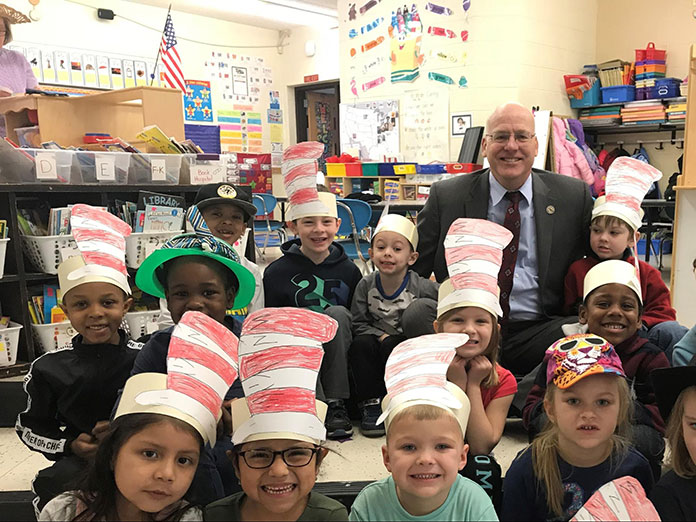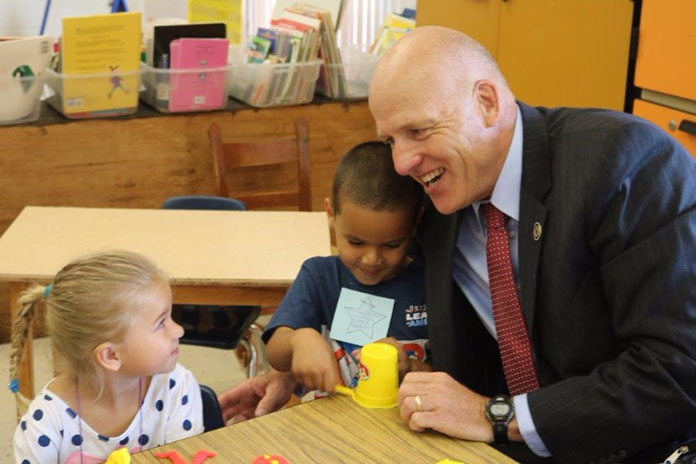
TOMS RIVER – Despite deep cuts in state aid funding that threaten the future of extracurricular activities, sports and full day kindergarten, school officials in the district are determined to retain its plan for early education.
School administrators noted this week that they have no intention to backtrack on, despite millions of dollars in state aid reductions, a scenario where the district would drop that a full day kindergarten program.
During the Board of Education’s search for a new superintendent back in 2013, one of its top priorities was finding a leader who could implement a comprehensive full-day kindergarten program in its 12 elementary schools.
The district was among only 19 percent statewide at the time, that didn’t offer full day kindergarten. Prior attempts, contingent on Toms River taxpayers approving millions in referendum dollars, had failed.
District officials expressed quality early age programs were necessary. The need becoming increasingly evident as families eligible for the free and reduced lunch program has steadily soared, jumping from around 20 percent pre-Superstorm Sandy to 29.3 percent in 2019, with 10 schools currently qualifying for Title I targeted assistance.
It was determined that socioeconomically disadvantaged students are at increased risk of falling behind their peers without early interventions and after a year of preparation that included resource reallocations, curriculum writing, room reconfigurations, staff training, furniture and materials purchases, new Superintendent David Healy and his team moved forward on a plan.
Their vision became a reality and at no cost to taxpayers. “This initiative represents more than just a longer school day,” Elementary Assistant Superintendent Debra McKenna said.
McKenna added, “it represents a wholesale change in curriculum, using research-based practices that focus on social interaction, positive decision making, individualized learning, and center-based activities to foster independence.”
During its initial phase Dr. Vincent Costanza, director of the NJDOE’s Office of Primary Education, visited the district on several occasions and praised the district’s implementation as a model program at a June 2016 Board of Education meeting.
It has been five years now and the first round of students to experience full day kindergarten is in fourth grade. While it is still early to determine the full breadth of its academic impact, one clear outcome has been a significant drop in retention– from 2015-2016 to 2018-2019, a 69 percent decline among first graders.
Director of K-5 Curriculum Cara DiMeo said, “the research is clear that students who are retained face significant challenges moving forward,” said. “They are more likely to drop out and face increased social-emotional hurdles through the change in peer relationships. And from a district standpoint, there is a financial impact.”

The number of students receiving basic skills services has also dropped, from 22 percent to 18 percent. This is consistent with research-based evidence that students accustomed to a full day of learning have better stamina coming into first grade, as well as a more solid foundation of literacy skills and greater conceptual understanding of mathematics.
These core skills transfer into other content areas and promote higher levels of success throughout their academic career. The more robust program also allows for earlier identification of and interventions for students with learning disabilities.
Changes in high stakes state tests over the past few years have made it difficult to accurately quantify the academic impact of full-day kindergarten.
A research-supported, problem-based, social-emotional approach is now used from pre-school to 12, program continuity has helped reduce chronic absenteeism and dropout rates, increased PSAT and SAT achievement, and advanced career opportunities.
Healy said, “this investment in our youngest students is transformative for a school district and honors advances at our intermediate and high schools.”
“Our initiatives continue to be recognized across the state, from literacy to computer science to makerspaces,” Healy added.
While the Department of Education does not mandate that districts offer full day kindergarten, it recommends it, and research supports its impact. Ironically, the state directed tens of millions in funding towards pre-school expansion when 20 percent of NJ schools don’t have full-day kindergarten.
It was noted that state aid cuts from Senate Bill S2 and the recent veto of a bill that would have provided cap relief to districts like Toms River Regional Schools, and educators are left bewildered.
“If we’re being stripped of the funding that otherwise would allow us to host our kindergarten program, and then denied any recourse to recoup that funding, what are we supposed to do?” asked Healy.
“While I fully support strong pre-schools, if it’s at the expense of kindergarten I have to ask, where are these preschoolers supposed to go at the culmination of pre-school?” Healy asked.
Though the full day program remains in place, state aid cuts continue to threaten its continuation beyond 2020-2021. Parents are strongly encouraged to register early to maximize the chances of their children being placed in their home school. Registration will take place in the twelve elementary schools in March 2020.
Additional information can be found at trschools.com/registration/kindergarten.







